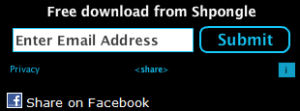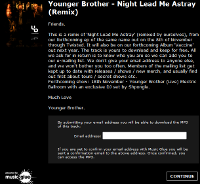Case Study: How Shpongle Went From Yelling At Fans To Embracing Fans
from the a-case-study dept
Over the last month or so, things have been quite busy at Techdirt, and we haven't had time to add to our case studies section, even though we have a few more lined up. However, Bas Grasmayer, sent over the following case study (also posted on his blog), which is a part of his thesis (which we've mentioned before). The case study is about Shpongle, a much respected group of musicians in a very specific niche, psychedelic chill-out, but it has attracted many fans of other genres too and is generally categorized as 'electronica'.A while before they released their latest album 'Ineffable Mysteries From Shpongleland,' it leaked onto filesharing networks and fans of Shpongle started discussing the new album on the internet forum of Shpongle’s record label, Twisted Music. Obviously, Simon Posford, the main person behind Shpongle and owner of the Twisted Music label, was very unhappy about this and lashed out:
"So some fucker has released the album on the internet already.... thanks a lot, whoever it was... Maybe twisted will still recoup, maybe not... all i know is that we are teetering on bankruptcy, and are seeking deals elsewhere.... the 12 loyal fans on this forum are not enough to sustain a record label.... How much do you think Twisted has in the bank account? Have a guess? More than $10,000 ? More than $20,000 ? Well it is actually less than $1,000..... Raj and i haven't even been paid our advance for this album.... All the artists on twisted are seeking deals with other labels now... We can't pay a label manager, and we can't pay the artists.... always putting our hope in 'just ONE more release'.... "We'll be ok if the DVD sells"...."Surely the Shpongle CD will sell, right?"
[...]
This sucks, for Twisted, for myself and Raj who have spent 3 years working on the album.... Just as i started looking around and posting on this forum again, i remembered why i shouldn't bother.... I'm outta here... Soon to be followed by Younger Brother [another project by Simon Posford] and probably Twisted...
Enjoy."
He got understandably emotional, but misdirected his anger towards perhaps the most dedicated fans: those who really cannot wait until the release and decided to preview it. After all, Shpongle hadn't released an album in four years and their following is quite fanatical about their music. Later in the same forum topic, he adds some more thoughts, which are also relevant to this case study:
"It's all very well to speculate, but i can tell you as a fact, we made more money before file sharing... we could survive... now not so.... and i think you will find it the same all over the music business... the argument that "file sharing is promotion" is probably valid.... in fact, i agree...in a way it serves a similar purpose to radio.... but the argument that "file sharing is promotion and therefore you will sell more CDs" is clearly absolute bollocks, otherwise the music industry would be booming right now!
[...]
Also i'm sorry that "And if it weren't for the internet, I would have given up on music entirely".... for me, the internet makes me want to give up music wink But i guess i'm from a different generation.... I started making some of the trance that probably fills your 100Gigs hard drive before i'd even heard of the internet... and i didn't need the internet to find a deep love of music... the rush of buying a new vinyl, of collecting every release/picture disc by my favourite artists…. discovering new music i liked, all underground, no radio-plugged mix CDs or whatever... ALL without the internet!"
Later on in the topic, which currently carries over 600 replies, fans started to suggest ideas to Simon. They encouraged each other to buy more merchandise, to replace old t-shirts or hoodies, to buy an extra album to give to a friend and they came up with ideas to help out Simon Posford, Shpongle, and Twisted Music.
And it seems Simon has also learned from the fact that you indeed will not sell more CDs even when filesharing is good promotion, as he noted. Being a fan myself, I was very delighted to receive a newsletter, one year after the leak, which featured some interesting new business models and experiments. It does a few things very well and I'll highlight this bit by bit. The opening paragraph is as follows:
"Dear Twisted fans,
The new Prometheus album has been doing very well on Beatport with 4 of his tracks reaching the Top10 of the electronica charts. If you haven't got your copy yet then Benji and Twisted would be happy if you could get onto Beatport and purchase at least the electronica tracks. We'd love to see him get to Number 1!
Ott is beginning his 6 date tour of the USA starting tonight! You can see and buy tickets to all his tour dates at the bottom of this newsletter. You can also join his Facebook Fan Page here.
We've also got two new tracks of Younger Brother and Shpongle available as a free download, keep reading to find out how to get hold of them."
What a dramatic change of tone, compared to the rants on the forum. This is how you connect with fans! First of all, it acknowledges fan support in terms of chart positions and makes a polite request (as opposed to lashing out or guilt-tripping fans, like on the forum). Also, it tries to unite the fans and give them a purpose; a mission. People love accomplishments, individually or in groups, if only for the little dopamine rewards our brains release.
They then give the fans more information and ways to connect with one of the labels artist's and finally reward fans with free music. That's a great way to open a newsletter.
 As for the free tracks, the newsletter featured two images with links to the place to download the song. Once on the page, the page showed a download button, which when clicked, becomes a box in which people must enter their email address (as seen on the left). So actually, they can see which email addresses support which artists, but also, when people choose to use one of the share buttons, they help Twisted Music get more email addresses than just the ones they already had for the newsletter.
As for the free tracks, the newsletter featured two images with links to the place to download the song. Once on the page, the page showed a download button, which when clicked, becomes a box in which people must enter their email address (as seen on the left). So actually, they can see which email addresses support which artists, but also, when people choose to use one of the share buttons, they help Twisted Music get more email addresses than just the ones they already had for the newsletter.
 Younger Brother's page was a little more complex (see screenshot on the right), with more information, but basically boils down to the same thing.
Younger Brother's page was a little more complex (see screenshot on the right), with more information, but basically boils down to the same thing.
The newsletter then continues with another exciting way of dealing with the reality created by the internet, which is crowd-funding:
"Many of you have already pledged on the Younger Brother album 'Vaccine'. We're working with pledge to raise money and to set up the best possible foundation to promote and release the record next year.
We're calling on the loyal and faithful to help. In exchange we're offering loads of interesting things from studio time with the band to limited artwork and access to rehearsals."
Again, a great way to involve fans and to offer them something exciting. It basically offers them a reason to do it for themselves, instead of telling them to please buy a CD because the label needs it (see forum post). Some of the 'items' on the list for people that pledge: signed CD (£15), new album and entire back catalogue (£25), coming to one of their rehearsals (£40), studio workshop (£300), being in one of their videos (£150), a unique personal remix of your favourite track of the album (£600), and much more.
The newsletter closes with more standard stuff, such as tour dates and the like.
RECAP
The strategy here is simple, yet complex. First of all, the label releases some very unique, high-quality music, which has given them a fanatical and evangelical following (Seth Godin would call this a tribe). Secondly, this following, together with the label, has turned into an ecosystem; when things were not going well, the ecosystem started figuring out ways in which it could survive as a whole. Thirdly, Simon Posford started paying close attention to his tribe and started catering directly to their needs. When reduced to a communication and business strategy, it becomes the formula of CwF (Connecting with Fans) and giving fans a RtB (Reason to Buy).
Giving away free songs is a good example of connecting with fans by rewarding them. The clearest reasons to buy in this mailing are the mission to get one of the label's artists to number 1, as well as all the rewards for pledging money for the new album.
It is important to note that this should not be done to generate profit, but should genuinely be done to please the fans and to give them what they want. I thoroughly believe that if you betray your fans' trust, you will lose them and your (potential) income.
Filed Under: embracing fans, shpongle

